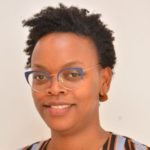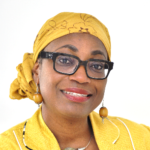An interview with Dr Fatima Denton, Director of the United Nations University – Institute for Natural Resources in Africa, for INET’s series on COVID-19 and Africa
Dr Fatima Denton is the Director of the United Nations University – Institute for Natural Resources in Africa (UNU-INRA) based in Accra, Ghana. She has depth of expertise in natural resource management, as well as deep knowledge of research and policy development, and the African region. Prior to joining UNU-INRA, Dr. Denton worked with the United Nations Economic Commission for Africa (UNECA) in Ethiopia since 2012. Her roles included Director of the Natural Resource Management Division and Coordinator of the African Climate Policy Centre. Before that Dr Denton was a Programme Leader with the Canada-based International Development Research Centre (IDRC), where she managed high-impact action research, including a major climate change adaptation research programme managing over 100 action research initiatives encompassing 40-plus projects across 33 countries in Africa.
We’re taking the opportunity to listen to people who can provide direct testimony of how COVID19 is affecting different parts of the African continent, and then reflecting on what this crisis means for the choices African economies face over the next 5-10 years. For you, in Accra, what are some of the more visible and less visible impacts of COVID19 on the city, Ghana and West Africa more broadly?
Dr Fatima Denton: In terms of the visible signs in Accra, you can divide it into two phases. At the initial stage when it was all starting, and we were seeing two digit numbers of those infected – we’re now in the hundreds – initially, while there was a sense of potential doom, no-one really took it seriously. The concept of “social distancing” was very foreign for people in Accra and Ghana more widely. But the commercial elite, especially the Lebanese shop-keepers, brought out the hand-sanitisers, and quite rapidly it became the new norm to wash your hands whenever you entered a shop. Ghanaians are compliant by nature, so everyone has complied with these new rules, while going about their normal business. However, once the situation became more alarming and border closures came into force, government slapped on a number of restrictions which ordinary people didn’t see coming, and then the mood changed. People began to take it all a lot more seriously, and Accra became like a ghost town – its been really quite something for such a loud and vibrant city. Streets were deserted, with hardly any traffic, and the shops were closed. You could only go and buy food, and there were police stationed at different parts of the city. There was a good sense of monitoring and compliance. In a few cases, people felt the police had been a bit heavy-handed on enforcement which was not well appreciated. So maybe we started with a humorous side to social distancing, but then people said to themselves “its here now” and people have really taken it seriously. It would feel almost criminal now to go out without a mask. Shops say “no mask, no entry”. When they partially lifted restrictions, we were all surprised, because we thought it a bit premature. Although government is doing a lot of testing and contact tracing, the bigger fear has been the economy, given the big impact on people and their livelihoods. People have a strong sense that they’re not just protecting themselves but protecting others too. There’s a real sense of greater public health awareness which I don’t think I have ever seen at such a scale.
In terms of food, farming and agriculture, what’s the picture? The rainy season must be beginning, and farmers need to get ploughing and sowing. I heard in some places the worry that governments were blocking travel out of the main cities, to protect rural communities. But with so many young people away during the dry season on migration, do they face difficulties making their way back home to help start planting and weeding?
Dr Fatima Denton: While both Accra and Kumasi have had partial lockdowns, there are not too many restrictions on travel, though buses have had to limit the numbers they take to avoid crowding. Food-wise, many Ghanaians grow a lot of what they eat. Prices are going up and I see more people begging, there are more street kids in evidence. Ghana already had a problem pre-COVID with people coming across the borders from Burkina Faso and Togo.
The government has done quite well in terms of safety nets offering cash and food. Everyone has been given 3 months’ relief for their water bills, and a discount on electricity bills – not just for the poorest groups but across the board. Front-line workers like nurses have been given food supplies – rice and other staples. Government has actually done what it said it would do. Of course you have to bear in mind this is an election year.
A number of analysts we have spoken to have emphasized that the pandemic is a really important moment for reflection to re-think development models, such as further regional integration, taking forward the African Continental Free Trade Agreement (AfCFTA), strengthening local production, integrating the informal sector better, diversifying production, and so on. Given your particular focus on energy, natural resources and sustainable development, how does this moment look to you?
Dr Fatima Denton: So much has already been said on this. There is a general narrative of “building back better” which many UN agencies and others espouse. And I do support this too, but I also ask – what is your point of departure? Certainly, we have to learn from this crisis. It’s a useful analogue – call it a “dress rehearsal” - and metaphor for more resilient development. But if we were to come out of this and go back to where we were, that would be really foolish. Taking a natural resource perspective, African countries need to recognise being richly endowed with these resources does not by itself bring prosperity. There is even greater urgency today to start Foresight Planning, which we talked about in the “stranded assets report” – it is even more urgent today. For oil reserves this is no longer a hypothetical question, its real. We are indeed in a situation of stranded assets, with oil prices near zero. Africa cannot put all its eggs in one basket. Some 70% of Africa’s export revenue comes from oil, gas and the mineral sector. Governments must plan for a diversified economy, an exit from fossil fuels, and shift towards a green transition. This planning has to happen today, it should have happened yesterday. We can’t go back to drilling and extraction, trying to make as much money as we can. Not only are these resources finite but there is low demand, which presents a big problem. On the flip side, there are many African countries who do not depend on these resources but who might be tempted to take advantage of what they see as cheap oil, and cheap coal. Take the case of Zambia which is building coal-fired power plants because coal is there in abundance. There are also some countries in Africa who see that, despite the unfortunate situation, there are a number of new opportunities to tap into. Countries like Rwanda who are choosing to invest more in their Nationally Determined Contributions (NDCs), saying let’s invest in our green sectors. Equally Ethiopia for a long time has had a Climate Resilient Green Economy (CRGE) growth and transformation plan, which has been very pioneering in many ways, especially in terms of their manufacturing.
So “build back better” depends on your departure point. Countries that start from a good departure point can reinforce their green ambition whereas others may be tempted back to rely on fossil fuels, because it is cheaper for them in the short term. The heightened indebtedness of many African countries today means some countries are going to be looking at cheap options, especially when it comes to energy. We’re a continent which is hugely energy poor despite having rich quantities of renewable energy sources. For well-established oil producing countries, it is wiser to look at the alternatives, and see oil as having a short lifespan, with a strategy to extract for a certain period of time, based on a regional market which would help with demand. Most first-world countries are not going to increase demand for oil, so producers like Nigeria, Angola, and Tanzania with its big gas fields, might want to co-develop their regional markets, to make sure they actually can receive some revenue from these resources.
With the “build back better” narrative, we must remember there are a number of structural global injustices already present: climate change in itself is a structural injustice. The path to a green transition could leave some people behind – hence the notion of a “just transition”. Take the informal sector which has been left on the periphery and hard hit by COVID19. The informal sector tends to be seen as an afterthought. So lets not superimpose one structural injustice on another.
In your blog and paper, you mention that African countries need to “manage the jump” to a low carbon economy, instead of being pushed. In the case of Ghana, they seem to have done well so far in managing revenues from oil and gas, and establishment of a sovereign wealth fund. How are they managing this?
Dr Fatima Denton: Ghana has been re-deploying revenue from oil into providing the Free Senior High School Programme. Clearly the education sector has been crucially impacted by COVID19. There is a stark digital divide. Take the University of Ghana which looks like a ghost town today. Students must follow their lectures on-line, but many cannot afford to do that. Buying data is expensive. This is where governments could be more strategic, and invest revenues in better infrastructure, supporting schools, making sure students have the relevant equipment, and digital gadgets. My own son has 3-4 hours in the morning online and often in the afternoon as well – that’s a lot of connectivity, made even more difficult where you have a lot of power outages as well. Governments really need to see how to plough back resources into sectors like IT. Most of the IT companies are not Ghanaian – they’re the big global companies, continuing a history of unequal trade, similar to that of natural resources, built on predation. There are essential sectors which need to be indigenized, to level the playing field and bring in more Ghanaian players. Ghana has been very strategic in use of oil rents. Gas has a less well-developed market in West Africa, which needs shaping, and with the clear understanding that this is not going to be an open-ended extraction process. Rather the money should be used to diversify into manufacturing, education, and other critical essential sectors.
Would you say Ghana is one of those countries for which oil has not brought the resource curse?
Dr Fatima Denton: Only up to a point. A recent report by UNECA on illicit financial flows shows there are disturbing emerging trends here too, with significant capital flight, and a lot of money being laundered. You only have to walk in the streets of Accra to see many buildings being erected left, right and centre. Government is trying to do something about it, and comparatively speaking has done well so far.
I wonder what your thoughts are on the debt question. There has been a lot of discussion about whether African countries, given the COVID19 crisis, should be granted relief or a moratorium on debt?
Dr Fatima Denton: There are clearly multiple levels of debt and liability. Take the extractives sector, where a number of contracts will have failed and concessions collapsed, given the big fall in oil and commodity prices. This will all bring litigation. There are many highly indebted countries in Africa, but we can also see that many rich countries will come out of this crisis with very large public debts. Senegal’s President Macky Sall has been calling for debt forgiveness but there are persistent concerns that this money once forgiven might end up in the wrong hands.
Debt is also linked to the notion of a “just transition”. If you have industrialised countries in Europe who offer funding on condition that African countries follow a green economic pathway, it is as though African countries are being asked to pay the price for the current state of the global environment - but they are not responsible for this. A more balanced approach would involve helping invest in the infrastructure which would enable a green economic pathway. If funding always comes with many conditions, it feels like you give with one hand but you take with the other. It doesn’t seem right that industrialised countries demand payment for the climate crisis which is a huge injustice in itself. “Build back better” cannot be something that you just say yes to - you must think hard about what it means. Do not just copy others. With the COVID crisis, many countries just blindly copied what happened in Europe and Asia. But you can’t just repeat a slogan such as “Build back better”. You have to really believe in it, like in Rwanda and Ethiopia. It is your insurance policy since it builds a more resilient economy for tomorrow, creating shock absorbers for the future.
What does a phase-out of fossil fuels look like? How could that work for a country like Nigeria and Angola, where oil runs through the veins of the economy and political system. What’s a realistic timeframe?
Dr Fatima Denton: It’s harder for well-established oil-dependent countries like Nigeria and Angola. It comes with a perception of oil reserves being a sovereign right, which will be there for generations to come. For most, phase-out by 2030 is too short. The African Union’s Agenda 2063 doesn’t talk explicitly about stranded assets, but it proposes two phases, the first of ten to fifteen years and then a periodic monitoring. African countries need to be looking at a 30-50 year time frame, during which a deliberate process to phase-out and diversify makes sense. It would be foolish to phase out right away and they can ill-afford this. This pandemic has meant Nigeria had to revise its economic forecasts very substantially, as it has seriously affected GDP. There is a huge opportunity for Africa to look at new energy resources, such as becoming the main supplier of Hydrogen to industrialised nations. African nations have only ever been price takers, and never sit around the tables where big decisions are made on oil and gas. They are takers of the risk but not takers of the profit which comes with these resources. By contrast, they could try and call the shots with a new generation of fuels. The other possibility relates to the 4th industrial revolution which depends on a range of important strategic minerals many of which we have here in countries like the Democratic Republic of the Congo (DRC). These offer a strategic entry point for building a different kind of economy. There are also many African countries without natural resource abundance, who need to invest in their human capital. Look at Japan, and South Korea which have become very prosperous on the basis of investing in people. There is a lesson there to learn. There is quite a good analogy with basketball players and athletes who can take advantage of their youthfulness up to a certain point, then they have to stop playing sport and diversify into advertising, communications, and all sorts of other things.
If we take the African Continental Free Trade Agreement (AfCFTA), many are concerned that this will not be implemented according to the timetable. Many trade flows are currently seriously derailed. One sweet spot coming out of this crisis could be a focus on developing regional commodity markets and value chains, which allows for a deepening of our internal markets. This regional integration of economic activity and trade flows within Africa could make us less vulnerable, spread the risk and allow us to decouple from the very outward focused pattern of production and trade we have followed for decades, at our expense.
About the COVID-19 and Africa series: a series of conversations conducted by Dr. Folashadé Soulé and Dr. Camilla Toulmin in support of INET’s Commission on Global Economic Transformation (CGET) with African economists and experts about their perspective on economic transformation and how the COVID situation re-shapes the options and pathways for Africa’s development









